接宾语补足语的动词汇总
宾补动词顺口溜

宾补动词顺口溜
宾语补足语是句中宾语的补充说明,一般与宾语搭配逻辑合理,语法正确,意思通顺。
以下是关于宾补动词的顺口溜,仅供参考:
1. 宾语补足语,切莫胡乱加,动词意思要表达清楚全靠它。
2. have/make/let/see/watch/notice/observe/hear/feel/listen to +宾语+宾补。
3. 动词不定式,有它没划线;to后啥都没,to后很自由。
4. to +及物动词变不定式。
5. 感官动词和使役动词接宾补,省略to来不忘记。
6. 动词原形前面加to,变成不定式。
7. to后接原形,to前加be done。
8. 一感二听三让四看半帮助,主动不能接to。
9. 若被to接通,条件和时间来帮忙。
10. 主从复合句,宾补须加从句中。
宾语补足语总汇
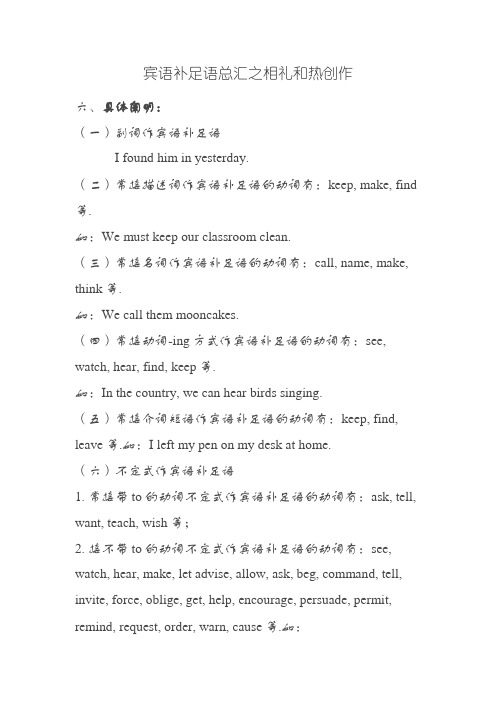
宾语补足语总汇之相礼和热创作六、具体阐明:(一)副词作宾语补足语I found him in yesterday.(二)常接描述词作宾语补足语的动词有:keep, make, find 等.如:We must keep our classroom clean.(三)常接名词作宾语补足语的动词有:call, name, make, think等.如:We call them mooncakes.(四)常接动词-ing方式作宾语补足语的动词有:see, watch, hear, find, keep等.如:In the country, we can hear birds singing.(五)常接介词短语作宾语补足语的动词有:keep, find, leave等.如:I left my pen on my desk at home.(六)不定式作宾语补足语1. 常接带to的动词不定式作宾语补足语的动词有:ask, tell, want, teach, wish等;2. 接不带to的动词不定式作宾语补足语的动词有:see, watch, hear, make, let advise, allow, ask, beg, command, tell, invite, force, oblige, get, help, encourage, persuade, permit, remind, request, order, warn, cause等.如:I often see him play football.She often asks me to help her.We don't allow such things to happen again.Most of the parents agree to forbid their children to smoke. She asked me to answer the phone in her absence.Please remind me to leave her this note.She requested him to go with her.3. 用不定式作宾语补足语的几种阐明:①help后面作宾语补足语的动词不定式可以带to也可以不带to.如:I often help my mother(to) do some housework.②在使役动词后作宾语补足语,不定式不带to.有些动词跟不定式作宾语补足语时省往了to,这些动词有:一感二听三让四观看.一感:feel二听:hear, listen to三让:let, have, make四观看:observe, see, watch, look at这类动词有:make, let, have等.转为自动语态时,其后通常都用带to的不定式 (have没有自动语态).What would you have me do?你要我做什么?She made him give up smoking.她让他戒了烟.Let him do whatever he wishes to do.他想干什么就让他干吧.Though he had often made his little sister cry, today he was made to cry by his littlesister.虽然经常是他弄哭小妹妹,但今天他却被小妹妹弄哭了3. 掌握“使役动词 have + 宾语+过往分词”的几种含义在“ have +宾语+过往分词”结构中,过往分词作宾语补足语, have 也可用 get .这一结构具有以下几种含义:①意为“主语请别人做某事”.例如:He wants to have his eyes examined tomorrow.他今天想往检查眼睛.(“检查”的动作由医生来进行)②意为“主语遭遇、蒙受某一不愉快、不测的事变”.例如:Be careful, or you'll have your hands hurt.当心,否则会弄伤手的.③意为“使完成某事”,事变既可以是别人做完,也可以由主语介入完成.例如:He had the walls painted this morning.他今早把墙漆了. (主语本人可能介入)④动词不定式也可作一些短语动词的宾语补足语.I'm waiting for James to arrive.我正等着詹姆斯的到来. He's arranged for a car to pick them up at the station.他已安插了一辆汽车往车站接他们.The UN has called on both sides to observe the cease fire.联合国号召交战单方服从开火协议.(七)分词作宾语补足语用如今分词作宾补,阐明宾语是动作的发出者,构成逻辑上的主谓关系;用过往分词作宾补,暗示宾语是动作的承受者,构成逻辑上的动宾关系.1. 跟分词作宾补的动词有:catch, have get, keep, hear, find, feel, leave, make, want, start, notice, observe, watch, set等.例如:There was so much noise t hat the speaker couldn’t make himself heard.由于非常吵闹,讲话人没法让人听到他的声响.When he awoke, he found himself being looked after by an old woman.他醒来的时分发现一位老大娘正在照顾他.2. 几种用过往分词作宾语补足语的状况阐明:①暗示“意欲;命令”的动词,如 like, want, wish, order 等,可用过往分词作宾语补足语.例如:The father wants his daughter taught the piano.这位父亲想让女儿学钢琴.②感官动词 see, hear, notice, observe, watch, feel, find 等后,可用过往分词作宾语补足语.例如:I saw an old man knocked down by a car just now.刚才我看到一位老人被车撞倒了.③使役动词 have, get, make, leave, keep等后可用过往分词作宾语补足语.例如:Have you got your films developed? 你拿胶卷往冲洗了没有?④“ with +宾语+过往分词”结构中,过往分词用作介词with 的宾语补足语.这一结构通常在句中作工夫、方式、条件、缘故原由等状语.例如:The murderer was brought in, with his hands tied behind his back.凶手被带进来了,他的双手被绑在面前.(表方式)With water heated, we can see the steam.水一被加热,我们就会看到水蒸气.(表条件)With the matter settled, we all went home.事变得到处理,我们都回家了.(表缘故原由)V.+宾语+宾补高考全解析“动词+宾语+宾补”的试题是高考试题中常考的学问点,这里呢,我就高考常考的能跟接“宾语+宾补”复合结构的动词进行偏重讲解,以帮忙大家掌握这一学问点:一、“make+宾语+宾补”的用法“make+宾语+宾补”这一结构中,宾语补足语可以由名词、描述词、过往分词、不定式等来充当,例如:(1)A good friend is someone who makes you happy.(描述词作宾补)(2)They made me repeat the story.(省to的动词不定式)(3)He raised his voice to make himself heard.(过往分词作宾补) 注:“make+宾语+宾补”结构中不必如今分词充当宾补.(4)We made him monitor of our class.(名词作宾补)注:职务名词充当宾补时其后面不要加冠词. 【高考试题链接】1. He is very popular among his students as he always tries to make them _____ in his lectures.(07江苏卷)A.interested B.interesting C.interest D.to interest2. My parents have always made me _____ about myself, even when I was twelve. A.feeling well B.feeling good C.feel well D.feel good答案:1.A 2.D二、“with+宾语+宾补”的用法“with+宾语+宾补”是高考试题中考查非常频繁的结构,“with+宾语+宾补”结构中的宾补次要有描述词、如今分词、过往分词、动词不定式等,在考题中常要求选择宾补的方式,在选择时宾补空间该运用什么方式,次要限决于宾语与宾补的关系,自动关系用如今分词,自动关系则用过往分词,此外,不定式作宾补要暗示含义为将来的意味,例如:(1)With so many people communicating in English every day, it will become more and more important to have a good knowledge of English.(宾语so many people与communicate是自动关系,因而用如今分词作宾补)(2)With everything he needed to buy, he went into the store.(不定式作宾补暗示将来的含义)(3)With everything he needed bought, he left the store.(过往分词作宾补表自动表完成)(4)With my key lost, I couldn’t enter my room.(过往分词作宾补)(5)With nothing to do, I went out for a walk.(不定式作宾补)(6)I went out with the window open.(描述词作宾补) 另外,“with+宾语+宾补”结构中还可由介词短语、副词短语来充当宾补,如:(1) She said good-bye with tears in her eyes.(2) He left the room with the light still on. 【高考试题链接】1.—Come on, please give me some ideas about the project. —Sorry. With so much work ______ my mind, I almost break down.A.filled B.filling C.to fill D.being filled2. John received an invitation to dinner, and with his work______ he gladly accepted it.A.finished B.finishing C.having finished D.was finished3. I couldn’t do my homework with all the noise______.(05北京)A.going on B.goes on C.went on D.to go on 答案:1. B 2. A 3. A三、“have+宾语+宾补”的用法在“have+宾语+宾补”这一结构用法中,充当宾补的经常运用的有do,doing, done 和adj,例如:(1) I’ll have my hair cut this afternoon.我今天下午要理发.(2) I won’t have you saying to your mother that way.(3) He realized that she did not wish to have her go with him.(4) I expect Amy will have the tea ready directly. 留意:have sth done的含义为“请别人来做某事或遭遇到某到状况”,例如: (1)I had the door painted last week.(2)He had his pocket picked.(3)She had her watch stolen. 【高考试题链接】1. Jenny hopes that Mr. Smith will suggest a good way to have her written English _____ in a short period.A.improved B.improving C.to improve D.improve2.—Did Peter fix the computer himself? —He _____, because he doesn’t know much about computers.(07安徽卷)A.has it fixed B.had fixed it C.had it fixed D.fixed it 3.You should understand the traffic rule by now. You’ve had it _____ often enough.(05天津) A.explaining B.to explain C.explain D.explained答案:1. A 2. C 3. D四、“find+宾语+宾补”的用法“find+宾语+宾补”这一结构中的宾语补足语可以由如今分词、过往分词、名词、描述词、副词、介词短语以及不定式to be等来充当.分别举例如下:(1)You will find it a very difficult book.(2)The youth found it a hard problem to think about.(3)When he came to himself, he found himself surrounded by a group of boys. (4)I hope to find you in better spirits when we meet again.(5)I find the Chinese people to be happy and cheerful.留意:find+宾语+宾补这一结构中通常不运用动词原形来充当宾语补足语,即没有“find+宾语+动词原形”这样的结构. 【高考试题链接】A cook will be immediately fired if he is found ____ in the kitchen.(03天下卷) A.smoke B.smoking C.to smoke D.smoked 答案:B. 五、“leave+宾语+宾补”的用法Leave+宾语+宾语补足语,其中宾语补足这一成分可以由过往分词、如今分词、描述词、介词的复合结构等来充当,分述如下:1.由过往分词来充当宾语补足语:leave sth/sb done,经常运用来暗示宾语所处的形态或暗示动作曾经完成.(1)Please excuse me if I have left any of your questions unanswered.(2)He got up slowly leaving the lunch unfinished.(3)Did you leave the doors and windows firmly fastened? △可用于自动语态: Hi!My patient can’t be left unattached.2.由如今分词来充当宾语补足语:leave sb/sth doing,经常运用来暗示使某人或某物不停做某事: (1)Don’t leave her waiting outside in the rain.(2)They went off together and left me sitting there. (3)Weleft him painting the gate. △可用于自动语态: Now thetemple has only its walls left standing. The papers were left lying around.3.由描述词来充当宾语补足语: (1)You’d better leave the drawing-room door open. (2)His illness has left him weak. △可用于自动语态: The window was left open.4.由介词的复合结构充当宾语补足语: (1)Leave him in peace! (2)His illness left him with a weak heart. (3)You’ve left her name off the list. △可用于自动语态: I was left without a ray of hope. 【高考试题链接】A good story does not necessarily have to have a happy ending, but the reader must not be left______.(06天津卷) A.unsatisfied B.unsatisfying C.to be unsatisfying D.being unsatisfied 答案:A六、“hear+宾语+宾补”的用法“hear+宾语+宾补”这一结构中的宾补常可以由如今分词、不带to的不定式、过往分词等来充当,如: Through the wall he could hear Harris cleaning his teeth. She could hear the rain pattering against the windows. Have you ever heard a pop song sung in Japanese? I won’t hear anything said against him behind his back. 【高考试题链接】 After a knock at the door, the child heard his mother’s voice _____ him.(07上海卷) A.calling B.called C.being called D.to call 答案:A.。
接宾补的动词(最全整理)

之袁州冬雪创作常跟复合宾语的动词有:call(叫),named(叫做),make(做),think(思考),find(找),leave (分开),keep(坚持),nominate(任命),choose,elect(选举),define(定义),regard(认为),see(看),recognize(认出),treat,take,consider(思索),look up,refer to(提到),accept(承受),acknowledge(承认),describe,depict(描绘),represent(表示出),declare(宣称),denounce(指责),employ(雇佣),use(使用),show(展示),organize,express(表达)等.接不定式作宾补的36个常常使用动词advise sb. to do sth. 建议或人做某事allow sb. to do sth. 允许或人做某事ask sb. to do sth.请(叫)或人做某事bear sb. to dobeg sb. to do sth. 请求或人做某事cause sb. to do sth. 导致或人做某事command sb. to do sth. 饬令或人做某事drive sb. to do sth .驱使或人做某事elect sb. to do sth. 选举或人做某事encourage sb. to do sth. 鼓励或人做某事expect sb. to do sth. 期望或人做某事forbid sb. to do sth. 制止或人做某事force sb. to do sth. 强迫或人做某事get sb. to do sth. 使(要)或人做某事hate sb. to do sth. 讨厌或人做某事help sb. to do sth. 帮忙或人做某事intend sb. to do sth. 打算要或人做某事invite sb. to do sth. 邀请或人做某事leave sb. to do sth. 留下或人做某事like sb. to do sth. 喜欢或人做某事mean sb. to do sth. 打算要或人做某事need sb. to do sth. 需要或人做某事oblige sb. to do sth. 迫使或人做某事order sb. to do sth. 饬令或人做某事permit sb. to do sth. 允许或人做某事persuade sb. to do sth. 说服或人做某事prefer sb. to do sth. 甘愿或人做某事request sb. to do sth. 要求或人做某事remind sb. to do sth. 提醒或人做某事teach sb. to do sth .教或人做某事tell sb. to do sth. 告诉或人做某事train sb. to do sth. 训练或人做某事trouble sb. to do sth. 费事或人做某事want sb. to do sth. 想要或人做某事warn sb. to do sth. 正告或人做某事wish sb. to do sth. 希望或人做某事“原谅或人做某事”,excuse [forgive] sb. for doing sth..“希望或人做某事”,wish sb. to do sth..“建议或人做某事”,advise sb. to do sth..“安插或人做某事”,arrange for sb. to do sth..“要求或人做某事”,demand of sb. to do sth..“感谢或人做某事”,thank sb. for doing sth..“祝贺或人做某事”,congratulate sb. on doing sth..“阻止或人做某事”,prevent sb. from doing sth..接现在分词作宾补的20个常常使用动词bring sb. doingcatch sb. doing sth. 碰上(撞上)或人做某事discover sb. doing sth. 发现或人做某事feel sb. doing sth. 感觉或人做某事find sb. doing sth. 碰上(撞上)或人做某事get sb. doing sth. 使或人做某事have sb. doing sth. 使或人做某事hear sb. doing sth. 听见或人做某事keep sb. doing sth. 使或人不断地做某事listen to sb. doing sth. 听或人做某事look at sb. doing sth. 看着或人做某事notice sb. doing sth. 注意到或人做某事observe sb. doing sth. 观察或人做某事prevent sb. doing sth. 阻止或人做某事see sb. doing sth. 看见或人做某事send sb. doing sth.使或人(突然)做某事set sb. doing sth. 使(引起)或人做某事start sb. doing sth. 使或人开端做某事stop sb. doing sth. 阻止或人做某事watch sb. doing sth. 观察或人做某事接动词原形作宾补的11个常常使用动词feel sb. do sth. 感觉或人做某事have sb. do sth. 使或人做某事hear sb. do sth. 听见或人做某事let sb. dolisten to sb. do sth. 听着或人做某事look at sb. do sth. 看着或人做某事make sb. do sth. 使或人做某事notice sb. do sth. 注意或人做某事observe sb. do sth. 观察或人做某事see sb. do sth. 看见或人做某事watch sb. do sth. 观察或人做某事在某些短语后也可跟带to的不定式作宾补.这类动词短语罕见的有:wait for,call on,depend on,care for,long for等.例如:The crocodile waited for the monkey to c ome down again.鳄鱼等着猴子再下来. The chairman called on Mr Brown to spea k.主席请布朗先生讲话. I shouldn't care for that man to be my doctor.我不要那人给我看病.不带to的不定式作宾补动词不定式在使役动词(make,let,have)或感官动词(feel,listen to,hear,look at,see,watch,notice)之后作宾补时不定式需省去to.为了便于记忆,我们可以这样记“一感”(feel)、“二听”(listen to,hear)、“三让”(let,make,have)、“四看”(look at,see,watch,notice).。
宾语补足语

Object complement宾语补足语宾语补足语对宾语作出进一步的补充说明。
●They called her the Loulan Beauty.在这句话中,her是宾语,the Loulan Beauty作宾语补足语,补充说明宾语her的情况。
●Many people were buried alive.●We found the ruins most interesting.一、动词总结能带宾语补足语结构的动词一定是及物动词。
➢第一类:感觉动词,如see, hear, feel, smell, watch, notice等,这类词所接的宾补可以是-ing形式,也可以是动词原形。
He heard a distant voice shouting.I could smell Chinese vegetables cooking.Did you see a cat being driven away?➢第二类:含使动意义的动词,如let, have, get, make, would like, want等,这类词所接的宾补多是动词原形或过去分词。
We’ve just had the house decorated.You must get the car repaired.At my school they don’t make us wear school uniform. They let us wear whatever we like.I want the work finished by January 1st.➢第三类:含命名意义的动词,如call, name, appoint, elect, make, consider等,这类词所接的宾补一般是名词。
Call me Joe, please.She was elected the president of the company.They have made me the chairman.They have made me a nice chair.➢第四类:v+sb+to do sth结构中的动词,所接的宾补多是不定式。
宾语补足语汇总

宾语补足语汇总一、定义:宾语补足语通常紧跟在宾语之后,对宾语进行补充说明。
二、句子结构是:主+谓+宾+宾补三、两种结构:1.主表型:1) make our country beautiful (adjective)2) call him Lao Li (noun)3) find sb. out (adv.)4) find sb. at home (Prep. phrase)2. 主谓型:1) ask sb. to do sth.(有to 不定式)2) have sb. do sth. (无to 不定式)3) see sb. doing sth. (现在分词)4) have sth. done. (过去分词)四、什么动词后可有宾语补足语:1. 在表示心理状态的动词后作宾语补足语。
这类动词有:consider, think, believe, discover, find, imagine, judge, suppose, prove等。
这类动词后的不定式通常是"to be+形容词或名词"结构,think, consider, find后的to be常可省略。
We consider him (to be) a good teacher.我们认为他是一个好老师。
He proved that theory (to be) very important.他证明那个理论是很重要的。
I thought her (to be) nice and honest the first time I met her.我第一次见到她的时候就认为她人很好,很诚实。
2. 在表示情感状态的动词后作宾语补足语。
这类动词有:love, like, prefer, hate, want, wish, expect等。
I'd prefer you to leave him alone.我希望你不要打扰他。
I don't want there to be any trouble.我不想有任何麻烦。
宾语补足语英语
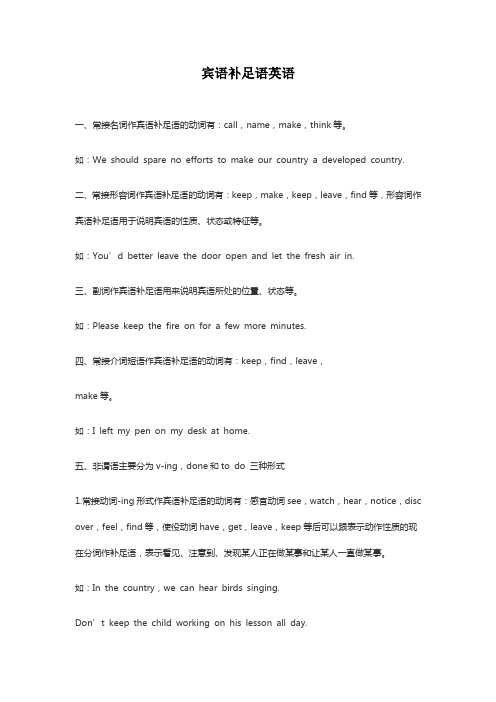
宾语补足语英语一、常接名词作宾语补足语的动词有:call,name,make,think等。
如:We should spare no efforts to make our country a developed country. 二、常接形容词作宾语补足语的动词有:keep,make,keep,leave,find等,形容词作宾语补足语用于说明宾语的性质、状态或特征等。
如:You’d better leave the door open and let the fresh air in.三、副词作宾语补足语用来说明宾语所处的位置、状态等。
如:Please keep the fire on for a few more minutes.四、常接介词短语作宾语补足语的动词有:keep,find,leave,make等。
如:I left my pen on my desk at home.五、非谓语主要分为v-ing,done和to do 三种形式1.常接动词-ing形式作宾语补足语的动词有:感官动词see,watch,hear,notice,disc over,feel,find等,使役动词have,get,leave,keep等后可以跟表示动作性质的现在分词作补足语,表示看见、注意到、发现某人正在做某事和让某人一直做某事。
如:In the country,we can hear birds singing.Don’t keep the child working on his lesson all day.2.接动词不定式作宾语补足语的动词有:ask,tell,want,teach,advise,allow,pers uade,warn,cause,require,encourage等;有些感官动词和使役动词,如:see,w atch,hear,feel,notice,observe,make,have,let等。
最新接宾补的动词(最全整理)

常跟复合宾语的动词有:call(叫),named(叫做),mak e (做),think(思考),find(找),leave(离开),k eep(保持),nominate(任命),choose,elect(选举),define(定义),r egar d(认为),see(看),recognize(认出),treat,take,consider(考虑),look up,refer t o(提到),accept(接受),acknowledge(承认),describe,depict(描述),represent(表现出),declare(宣称),de no un ce(指责),employ(雇佣),use(使用),show(展示),organize,express(表达)等。
接不定式作宾补的36个常用动词advise sb.t o do sth.建议某人做某事allow sb.t o do sth.允许某人做某事ask sb.t o do sth.请(叫)某人做某事bear sb.t o do sth.忍受某人做某事beg sb.t o do sth.请求某人做某事cause sb.t o do sth.导致某人做某事command sb.t o do sth.命令某人做某事drive sb.t o do sth.驱使某人做某事elect sb.t o do sth.选举某人做某事encourage sb.t o do sth.鼓励某人做某事expect sb.t o do sth.期望某人做某事forbid sb.t o do sth.禁止某人做某事force sb.t o do sth.强迫某人做某事get sb.t o do sth.使(要)某人做某事hate sb.t o do sth.讨厌某人做某事help sb.t o do sth.帮助某人做某事intend sb.t o do sth.打算要某人做某事invite sb.t o do sth.邀请某人做某事leave sb.t o do sth.留下某人做某事like sb.t o do sth.喜欢某人做某事mean sb.t o do sth.打算要某人做某事need sb.t o do sth.需要某人做某事oblige sb.t o do sth.迫使某人做某事order sb.t o do sth.命令某人做某事permit sb.t o do sth.允许某人做某事persuade sb.t o do sth.说服某人做某事prefer sb.t o do sth.宁愿某人做某事r equest sb.t o do sth.要求某人做某事remind sb.t o do sth.提醒某人做某事teach sb.t o do sth.教某人做某事tell sb.t o do sth.告诉某人做某事train sb.t o do sth.训练某人做某事trouble sb.t o do sth.麻烦某人做某事want sb.t o do sth.想要某人做某事warn sb.t o do sth.警告某人做某事wish sb.t o do sth.希望某人做某事“原谅某人做某事”,excuse[forgive]sb.for doing sth.。
感官动词后的宾语补足语
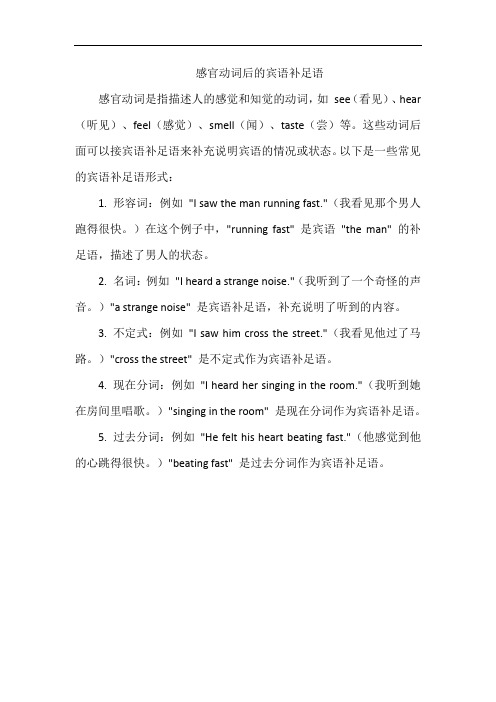
感官动词后的宾语补足语
感官动词是指描述人的感觉和知觉的动词,如see(看见)、hear (听见)、feel(感觉)、smell(闻)、taste(尝)等。
这些动词后面可以接宾语补足语来补充说明宾语的情况或状态。
以下是一些常见的宾语补足语形式:
1. 形容词:例如"I saw the man running fast."(我看见那个男人跑得很快。
)在这个例子中,"running fast" 是宾语"the man" 的补足语,描述了男人的状态。
2. 名词:例如"I heard a strange noise."(我听到了一个奇怪的声音。
)"a strange noise" 是宾语补足语,补充说明了听到的内容。
3. 不定式:例如"I saw him cross the street."(我看见他过了马路。
)"cross the street" 是不定式作为宾语补足语。
4. 现在分词:例如"I heard her singing in the room."(我听到她在房间里唱歌。
)"singing in the room" 是现在分词作为宾语补足语。
5. 过去分词:例如"He felt his heart beating fast."(他感觉到他的心跳得很快。
)"beating fast" 是过去分词作为宾语补足语。
宾语补足语总汇

宾语补足语总汇Company Document number:WTUT-WT88Y-W8BBGB-BWYTT-19998宾语补足语总汇六、具体说明:(一)副词作宾语补足语I found him in yesterday.(二)常接形容词作宾语补足语的动词有:keep, make, find等。
如:We must keep our classroom clean.(三)常接名词作宾语补足语的动词有:call, name, make, think等。
如:We call them mooncakes.(四)常接动词-ing形式作宾语补足语的动词有:see, watch, hear, find, keep 等。
如:In the country, we can hear birds singing.(五)常接介词短语作宾语补足语的动词有:keep, find, leave等。
如:I left my pen on my desk at home.(六)不定式作宾语补足语1. 常接带to的动词不定式作宾语补足语的动词有:ask, tell, want, teach, wish 等;2. 接不带to的动词不定式作宾语补足语的动词有:see, watch, hear, make, let advise, allow, ask, beg, command, tell, invite, force, oblige, get, help, encourage, persuade, permit, remind, request, order, warn, cause等。
如:I often see him play football.She often asks me to help her.We don't allow such things to happen again.Most of the parents agree to forbid their children to smoke.She asked me to answer the phone in her absence.Please remind me to leave her this note.She requested him to go with her.3. 用不定式作宾语补足语的几种说明:①help后面作宾语补足语的动词不定式可以带to也可以不带to。
接宾补的动词
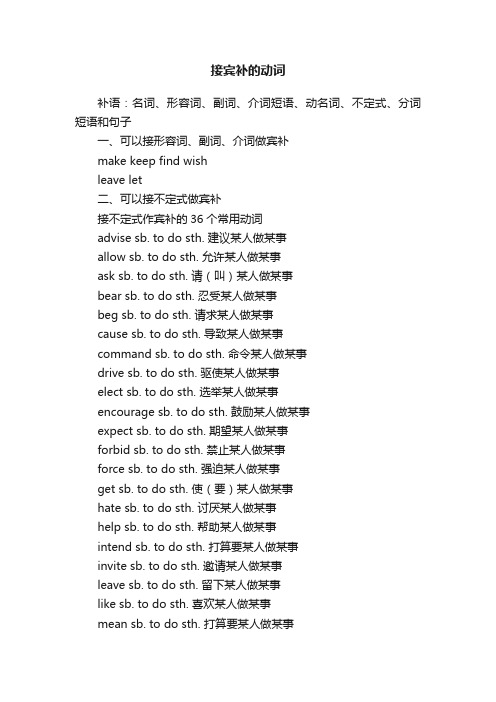
接宾补的动词补语:名词、形容词、副词、介词短语、动名词、不定式、分词短语和句子一、可以接形容词、副词、介词做宾补make keep find wishleave let二、可以接不定式做宾补接不定式作宾补的36个常用动词advise sb. to do sth. 建议某人做某事allow sb. to do sth. 允许某人做某事ask sb. to do sth. 请(叫)某人做某事bear sb. to do sth. 忍受某人做某事beg sb. to do sth. 请求某人做某事cause sb. to do sth. 导致某人做某事command sb. to do sth. 命令某人做某事drive sb. to do sth. 驱使某人做某事elect sb. to do sth. 选举某人做某事encourage sb. to do sth. 鼓励某人做某事expect sb. to do sth. 期望某人做某事forbid sb. to do sth. 禁止某人做某事force sb. to do sth. 强迫某人做某事get sb. to do sth. 使(要)某人做某事hate sb. to do sth. 讨厌某人做某事help sb. to do sth. 帮助某人做某事intend sb. to do sth. 打算要某人做某事invite sb. to do sth. 邀请某人做某事leave sb. to do sth. 留下某人做某事like sb. to do sth. 喜欢某人做某事mean sb. to do sth. 打算要某人做某事need sb. to do sth. 需要某人做某事oblige sb. to do sth. 迫使某人做某事order sb. to do sth. 命令某人做某事permit sb. to do sth. 允许某人做某事persuade sb. to do sth. 说服某人做某事prefer sb. to do sth. 宁愿某人做某事request sb. to do sth. 要求某人做某事remind sb. to do sth. 提醒某人做某事teach sb. to do sth. 教某人做某事tell sb. to do sth. 告诉某人做某事train sb. to do sth. 训练某人做某事trouble sb. to do sth. 麻烦某人做某事want sb. to do sth. 想要某人做某事warn sb. to do sth. 警告某人做某事wish sb. to do sth. 希望某人做某事三、可以接省略to的不定式做宾补动词不定式在使役动词(make,let,have)或感官动词(feel,listen to,hear,look at,see,watch,notice)之后作宾补时不定式需省去to。
可接不定式作宾语补足语的常见动词
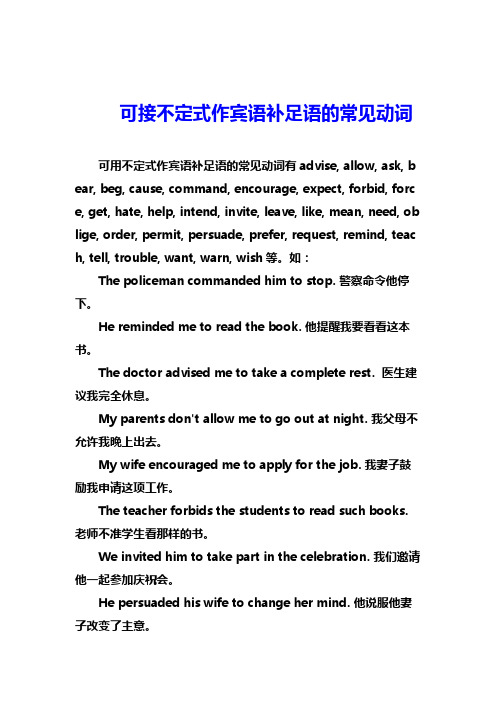
可接不定式作宾语补足语的常见动词可用不定式作宾语补足语的常见动词有advise, allow, ask, b ear, beg, cause, command, encourage, expect, forbid, forc e, get, hate, help, intend, invite, leave, like, mean, need, ob lige, order, permit, persuade, prefer, request, remind, teac h, tell, trouble, want, warn, wish等。
如:The policeman commanded him to stop. 警察命令他停下。
He reminded me to read the book. 他提醒我要看看这本书。
The doctor advised me to take a complete rest. 医生建议我完全休息。
My parents don't allow me to go out at night. 我父母不允许我晚上出去。
My wife encouraged me to apply for the job. 我妻子鼓励我申请这项工作。
The teacher forbids the students to read such books. 老师不准学生看那样的书。
We invited him to take part in the celebration. 我们邀请他一起参加庆祝会。
He persuaded his wife to change her mind. 他说服他妻子改变了主意。
Their parents prefer them to be home early. 他们的父母希望他们早点回家。
注:不要受汉语意思影响而误用不定式作宾语补足语。
如:汉语可说“害怕某人做某事”,但英语不说 fear sb to do st h。
(完整版)接宾语补足语的动词汇总
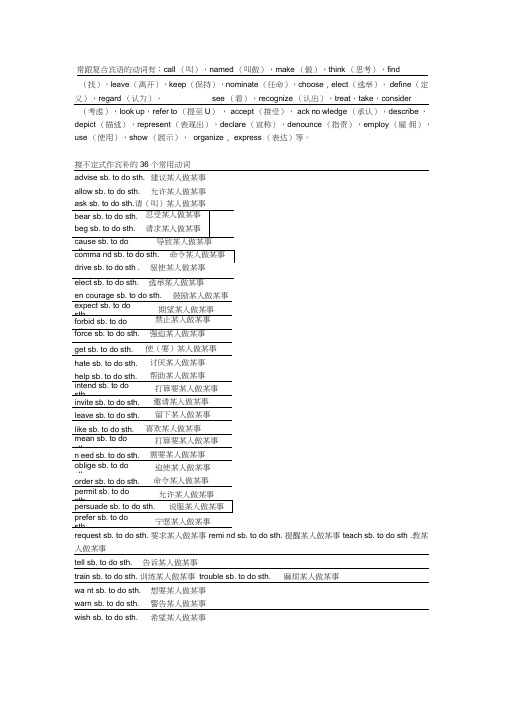
常跟复合宾语的动词有:call (叫),named (叫做),make (做),think (思考),find (找),leave (离开),keep (保持),nominate (任命),choose , elect (选举),define (定义),regard (认为),see (看),recognize (认出),treat,take,consider(考虑),look up,refer to (提至U),accept (接受),ack no wledge (承认),describe ,depict (描述),represent (表现出),declare (宣称),denounce (指责),employ (雇佣),use (使用),show (展示),organize , express (表达)等。
接不定式作宾补的36个常用动词advise sb. to do sth. 建议某人做某事allow sb. to do sth. 允许某人做某事request sb. to do sth. 要求某人做某事remi nd sb. to do sth. 提醒某人做某事teach sb. to do sth .教某人做某事tell sb. to do sth. 告诉某人做某事train sb. to do sth. 训练某人做某事trouble sb. to do sth. 麻烦某人做某事wa nt sb. to do sth. 想要某人做某事warn sb. to do sth. 警告某人做某事wish sb. to do sth. 希望某人做某事汉语的"原谅某人做某事”,英语可说成excuse [forgive] sb. for doi ng sth.不带to的不定式作宾补动词不定式在使役动词( make , let, have )或感官动词(feel , listen to , hear, look at , see , watch , notice )之后作宾补时不定式需省去to。
宾语补足语的归纳总结
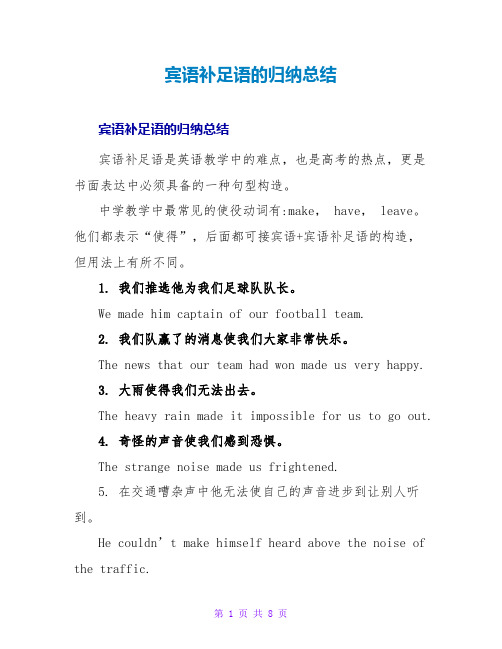
宾语补足语的归纳总结宾语补足语的归纳总结宾语补足语是英语教学中的难点,也是高考的热点,更是书面表达中必须具备的一种句型构造。
中学教学中最常见的使役动词有:make, have, leave。
他们都表示“使得”,后面都可接宾语+宾语补足语的构造,但用法上有所不同。
1. 我们推选他为我们足球队队长。
We made him captain of our football team.2. 我们队赢了的消息使我们大家非常快乐。
The news that our team had won made us very happy.3. 大雨使得我们无法出去。
The heavy rain made it impossible for us to go out.4. 奇怪的声音使我们感到恐惧。
The strange noise made us frightened.5. 在交通嘈杂声中他无法使自己的声音进步到让别人听到。
He couldn’t make himself heard above the noise of the traffic.6. 什么东西使得草生长?What makes the grass grow?注意:过去分词作make的宾语补足语时,变为被动语态不用加to; 但当不定式作其宾补时,变为被动语态一定要加to。
这个男孩被迫每天干十二个小时的活。
The boy was made to work twelve hours a day.1. Paul doesn’t have to be made ____. He always works hard.A. learnB. to learnC. learnedD. learning2. The result of the entrance exams was not made____ to the public until last Thursday.A. knowingB. knownC. to knowD. to be known答案:1.B2.Bhave sb. do sth.使得某人做某事have sb. doing sth.使得某人一直做某事have sth. done使得某事被做1. The teacher had her ____(recite) the text again.2. He wants to have his eyes ____(examine) tomorrow.3. Be careful,or you’ll have your hands____(hurt).4. He had the girl ____(stand) in the classroom the whole morning.5. He had the walls ____(paint) this morning.答案:1.recite 2.examined 3.hurt 4.standing5.painted只能用doing的情况1. 表示正在发生Be quick. They have the car waiting for you at the school gate.2. 否认句中表示(不能)容忍某人做……Iwon’t have him cheating in the exam.3. 表示某一时间内一直延续不断的动作He had us laughing all through the meals.1. I’ve had my radio ____ so soon becau se my father had me ____ it. A. repair; done B. repaired; doC. repairing; doD. repaired; done2. You can’t have the horse ____ all the way.It’s too hot.A. runB. to runC. runningD. to be running3. Mrs. Brown was much disappointed to see the washing machine she had had ____ went wrong again.A. itB. it repairedC. repairedD. to be repaired4. We will have you ____(know) that the machine has been made ____(work) at full speed.答案:1.B 2.C 3.C 4.know, to work1. 用形容词作宾语补足语出去时,不要关门。
动词做宾语补足语的例句
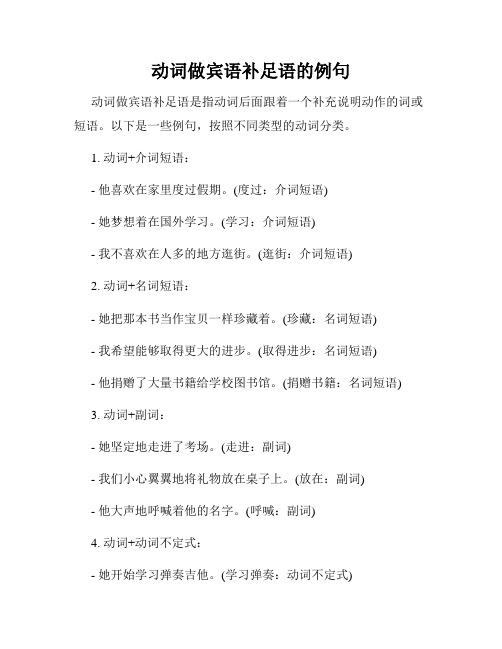
动词做宾语补足语的例句动词做宾语补足语是指动词后面跟着一个补充说明动作的词或短语。
以下是一些例句,按照不同类型的动词分类。
1. 动词+介词短语:- 他喜欢在家里度过假期。
(度过:介词短语)- 她梦想着在国外学习。
(学习:介词短语)- 我不喜欢在人多的地方逛街。
(逛街:介词短语)2. 动词+名词短语:- 她把那本书当作宝贝一样珍藏着。
(珍藏:名词短语)- 我希望能够取得更大的进步。
(取得进步:名词短语)- 他捐赠了大量书籍给学校图书馆。
(捐赠书籍:名词短语)3. 动词+副词:- 她坚定地走进了考场。
(走进:副词)- 我们小心翼翼地将礼物放在桌子上。
(放在:副词)- 他大声地呼喊着他的名字。
(呼喊:副词)4. 动词+动词不定式:- 她开始学习弹奏吉他。
(学习弹奏:动词不定式)- 我希望能够帮助他实现他的梦想。
(帮助实现:动词不定式) - 他决定放弃做医生的梦想。
(放弃梦想:动词不定式)5. 动词+动名词:- 她爱上了跳舞这项运动。
(爱上跳舞:动名词)- 我喜欢读书与写作。
(喜欢读书写作:动名词)- 他坚持每天锻炼身体。
(坚持锻炼:动名词)6. 动词+形容词:- 她把他的态度看作是一种挑战。
(看作挑战:形容词)- 我希望能够做出更好的成绩。
(做出更好:形容词)- 他把这个问题看得很重要。
(看得重要:形容词)7. 动词+副词短语:- 她不停地收集资料。
(收集资料:副词短语)- 我们经常一起去郊游。
(去郊游:副词短语)- 他频繁地与朋友交流。
(交流朋友:副词短语)以上是一些动词做宾语补足语的例句,涵盖了不同类型的动词和补足语结构,希望对你的学习有所帮助。
宾语补足语总汇

宾语补足语总汇六、具体说明:(一)副词作宾语补足语I found him in yesterday.(二)常接形容词作宾语补足语的动词有:keep, make, find等。
如:We must keep our classroom clean.(三)常接名词作宾语补足语的动词有:call, name, make, think等。
如:We call them mooncakes.(四)常接动词-ing形式作宾语补足语的动词有:see, watch, hear, find, keep等。
如:In the country, we can hear birds singing.(五)常接介词短语作宾语补足语的动词有:keep, find, leave等。
如:I left my pen on my desk at home.(六)不定式作宾语补足语1. 常接带to的动词不定式作宾语补足语的动词有:ask, tell, want, teach, wish等;2. 接不带to的动词不定式作宾语补足语的动词有:see, watch, hear, make, let advise, allow, ask, beg, command, tell, invite, force, oblige, get, help, encourage, persuade, permit, remind, request, order, warn, cause等。
如:I often see him play football.She often asks me to help her.We don't allow such things to happen again.Most of the parents agree to forbid their children to smoke.She asked me to answer the phone in her absence.Please remind me to leave her this note.She requested him to go with her.3. 用不定式作宾语补足语的几种说明:①help后面作宾语补足语的动词不定式可以带to也可以不带to。
接宾补的动词(最全整理)
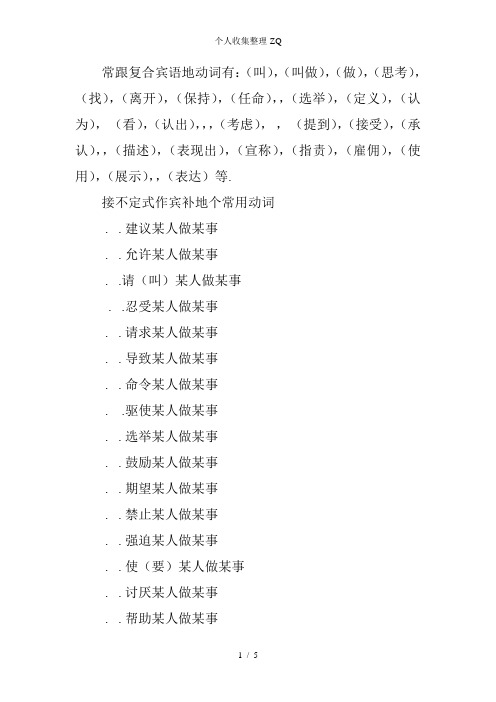
常跟复合宾语地动词有:(叫),(叫做),(做),(思考),(找),(离开),(保持),(任命),,(选举),(定义),(认为),(看),(认出),,,(考虑),,(提到),(接受),(承认),,(描述),(表现出),(宣称),(指责),(雇佣),(使用),(展示),,(表达)等.接不定式作宾补地个常用动词. . 建议某人做某事. . 允许某人做某事. .请(叫)某人做某事. .忍受某人做某事. . 请求某人做某事. . 导致某人做某事. . 命令某人做某事. .驱使某人做某事. . 选举某人做某事. . 鼓励某人做某事. . 期望某人做某事. . 禁止某人做某事. . 强迫某人做某事. . 使(要)某人做某事. . 讨厌某人做某事. . 帮助某人做某事. . 打算要某人做某事 . . 邀请某人做某事. . 留下某人做某事. . 喜欢某人做某事 . . 打算要某人做某事 . . 需要某人做某事 . . 迫使某人做某事 . . 命令某人做某事 . . 允许某人做某事. . 说服某人做某事. . 宁愿某人做某事 . . 要求某人做某事 . . 提醒某人做某事 . .教某人做某事. . 告诉某人做某事. . 训练某人做某事 . . 麻烦某人做某事 . . 想要某人做某事 . . 警告某人做某事. . 希望某人做某事“原谅某人做某事”, [] . .. “希望某人做某事”, . ..“建议某人做某事”, . .. “安排某人做某事”, . .. “要求某人做某事”, . .. “感谢某人做某事”, . .. “祝贺某人做某事”, . .. “阻止某人做某事”, . ..接现在分词作宾补地个常用动词 . .引起某人做某事. . 碰上(撞上)某人做某事 . . 发现某人做某事. . 感觉某人做某事. . 碰上(撞上)某人做某事 . . 使某人做某事. . 使某人做某事. . 听见某人做某事. . 使某人不停地做某事. . 听某人做某事. . 看着某人做某事. . 注意到某人做某事. . 观察某人做某事. . 阻止某人做某事. . 看见某人做某事. .使某人(突然)做某事. . 使(引起)某人做某事. . 使某人开始做某事. . 阻止某人做某事. . 观察某人做某事接动词原形作宾补地个常用动词. . 感觉某人做某事. . 使某人做某事. . 听见某人做某事. .让某人做某事. . 听着某人做某事. . 看着某人做某事. . 使某人做某事. . 注意某人做某事. . 观察某人做某事. . 看见某人做某事. . 观察某人做某事在某些短语后也可跟带地不定式作宾补.这类动词短语常见地有:,,,,等.例如:.鳄鱼等着猴子再下来. .主席请布朗先生讲话. ' .我不要那人给我看病.不带地不定式作宾补动词不定式在使役动词(,,)或感官动词(,,,,,,)之后作宾补时不定式需省去.为了便于记忆,我们可以这样记“一感”()、“二听”(,)、“三让”(,,)、“四看”(,,,).。
- 1、下载文档前请自行甄别文档内容的完整性,平台不提供额外的编辑、内容补充、找答案等附加服务。
- 2、"仅部分预览"的文档,不可在线预览部分如存在完整性等问题,可反馈申请退款(可完整预览的文档不适用该条件!)。
- 3、如文档侵犯您的权益,请联系客服反馈,我们会尽快为您处理(人工客服工作时间:9:00-18:30)。
常跟的有:call (叫),named (叫做),make (做),think (思考),find (找),leave (离开),keep (保持),nomin ate (任命),choose , elect (选举),defi ne (定义),regard (认为),see (看),recognize (认出),treat,take,consider (考虑),look up,refer to (提至U),accept (接受),acknowledge (承认),describe , depict (描述),represent (表现出),declare (宣称),denounce (指责),employ (雇佣),use (使用),show (展示),organize , express
(表达)等。
permit sb. to do sth. 允许某人做某事?
常跟的有:call (叫),named (叫做),make (做),think (思考),find (找),leave (离开),teach sb. to do sth . 教某人做某事
wa nt sb. to do sth. 想要某人做某事warn sb. to do sth. 警告某人做某事
汉语的"阻止某人做某事”,英语可说成
接现在分词作宾补的20个常用动词
bring sb. doi ng sth.引起某人做某事catch sb. doing sth. 碰上(撞上)某人做某事
discover sb. doi ng sth. 发现某人做某事feel sb. doi ng sth. 感觉某人做某事
find sb. doi ng sth. 碰上(撞上)某人做某事get sb. doing sth. 使某人做某事
have sb. doi ng sth. 使某人做某事hear sb. doi ng sth. 听见某人做某事
keep sb. doi ng sth. 使某人不停地做某事listen to sb. doi ng sth. 听某人做某事
The chairma n called on Mr Brown to speak .主席请布朗先生讲话。
I should n't care for that man to be my doctor .我不要那人给我看病。
不带to的不定式作宾补
动词不定式在使役动词(make , let, have )或感官动词(feel , listen to , hear, look at , see , watch , notice )之后作宾补时不定式需省去to。
为了便于记忆,我们可以这样记"一感”
(feel )、
"二听”(listen to , hear)、"三让”(let, make , have )、"四看”(look at , see , watch , notice )。
